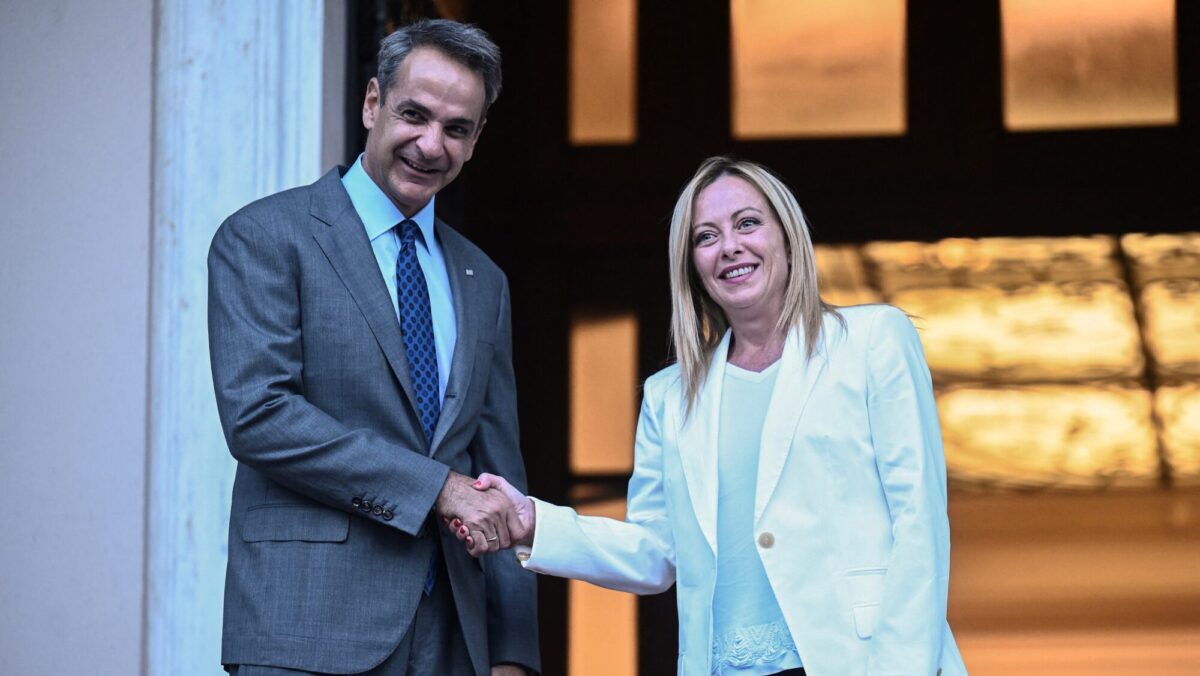
Photo by Angelos Tzortzinis / AFP
Italian Prime Minister Giorgia Meloni met with her Greek counterpart Kyriakos Mitsotakis in Athens late last week where the two leaders discussed forming an alliance to address illegal immigration as arrivals to both Greece and Italy have rocketed so far this year.
The pair discussed illegal migration during their August 31st meeting, including the need for closer cooperation with countries overseas, in particular with those in Africa, in order to help stem the flow of illegals in both their origin countries and those they transit through to reach Europe, the Italian news agency ANSA reports.
According to the news agency, the two leaders discussed putting more pressure on the European Union to act on illegal immigration and the two countries may also work together to help release funds promised by the European Commission to Tunisia, a main transit country for illegal crossings in the Mediterranean Sea to Europe.
Italian PM Meloni has had several discussions with the Tunisian government leadership in an effort to reach an agreement on illegal immigration and promised earlier this year to attempt to help Tunisia secure as much as €1 billion from the EU to help the country’s economy.
Meloni was also part of a delegation alongside European Commission President Ursula von der Leyen and outgoing Dutch Prime Minister Mark Rutte that saw an agreement reached with Tunisia to help the North African country economically while tackling people smuggling and illegal immigration.
“We have achieved a very important goal which comes after a great deal of diplomatic work. The Memorandum is an important step towards creating a real partnership between the EU and Tunisia,” Meloni said in July.
The deal has not been without its critics, however. Last week, some members of the European Parliament expressed concern, with German Christian Democratic Union (CDU) MEP Michael Gahler noting the proposed €255 million in funds offered to Tunisia is small compared to another deal between the country and Saudi Arabia that amounts to around half a billion euros.
Others have claimed that the Tunisians may not live up to their end of the deal in halting illegal migration, as they may be able to find alternative partners to repair their economy without having to agree to control migration flows.
Both Italy and Greece have been part of recent meetings among the Mediterranean states of the European Union that have previously called on other members of the EU to agree to migrant redistribution plans in order to ease the disproportionate burden of housing and taking care of migrants among the countries on the EU’s external borders.
In 2021, interior ministers from Cyprus, Greece, Italy, Malta, and Spain, dubbed the “MED 5,” called on the EU to also develop a centralised repatriation mechanism to help deport migrants ineligible for asylum status.
The MED 5 met again earlier this year in March, with Greek Minister of Migration and Asylum Notis Mitarachi noting that only 1% of all of the migrants who arrived illegally in 2022 in the European Union were redistributed under the current voluntary programme.
“We cannot continue to talk about the need to impose more responsibility on front-line member states if there is not an equally prescriptive and mandatory solidarity mechanism toward the countries of first reception,” he said.
Negotiations on a new Migration and Asylum Pact are still not completed, although some agreements were made in June regarding asylum seeker distribution among member states which could see states either hosting asylum seekers or providing financial support.
It remains to be seen what effect the new proposed alliance between Meloni and Mitsotakis will have as both of their nations have seen a surge in illegal arrivals this year.
The European Union border agency Frontex notes that while arrivals to Greece have decreased by around 29% so far this year compared to the same period in 2022, the route to Italy via the Central Mediterranean has increased by 115% and now accounts for half of all of the illegal entries to Europe.
The total number of illegal crossings, estimated by Frontex to be 176,100 in the first seven months of this year, is the highest since 2016.
